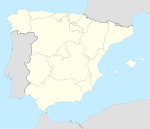La Roda
| La Roda municipality | ||
|---|---|---|
 La Roda - El Salvador church and house with corner facade
|
||
| coat of arms | Map of Spain | |

|
|
|
| Basic data | ||
| Autonomous Community : | Castile-La Mancha | |
| Province : | Albacete | |
| Comarca : | Mancha Alta Albaceteña | |
| Coordinates | 39 ° 12 ′ N , 2 ° 10 ′ W | |
| Height : | 719 msnm | |
| Area : | 395.34 km² | |
| Residents : | 15,476 (Jan 1, 2019) | |
| Population density : | 39.15 inhabitants / km² | |
| Postal code : | 02630 | |
| Municipality number ( INE ): | 02069 | |
| administration | ||
| Website : | La Roda | |
La Roda is a small town and a municipality ( municipio ) consisting of the capital and several hamlets (pedanías) and individual farmsteads with 15,476 inhabitants (as of January 1, 2019) in the southeastern Spanish province of Albacete in the autonomous region of Castile-La Mancha .
location
The place La Roda is located on the Autovía A-31 a good 40 km northwest of Albacete at an altitude of about 710 m above sea level. d. The climate in winter is cool, but in summer it is quite warm; the low amounts of precipitation (approx. 405 mm / year) fall - with the exception of the almost rainless summer months - distributed over the whole year.
Population development
| year | 1857 | 1900 | 1950 | 2000 | 2016 |
| Residents | 6.141 | 7,066 | 12,274 | 13,651 | 15,748 |
The continuous increase in population is mainly due to the ongoing immigration of people from the agrarian surrounding areas.
economy
La Roda is located in the mostly flat landscape of La Mancha , which is used for both field and pasture farming. In the past, vines were planted for self-sufficiency ; Vegetables came from the house gardens. Small traders, craftsmen and service providers of all kinds have settled in the village. Production of mineral paints developed around the middle of the 20th century . After the connection to the Autovía A-31 a commercial area (polígono industrial) was created .
history
Small Stone Age and Iberian finds have been discovered in the municipality . In Roman times the place was on the road between Complutum ( Alcalá de Henares ) and Carthago Nova ( Cartagena ). In the 8th century the region was overrun by the Moors , who could not be expelled from Castile (reign 1158–1214) until the end of the 12th century under Alfonso VIII ( reconquista ) . The area of the Tierra de Alarcón , to which Roda also belonged, was for a long time the border area between the Moorish and Christian spheres of influence. The place experienced its heyday in the 15th and 16th centuries.
Attractions
- The most important building in the area is the Iglesia de El Salvador , built in the 16th century . It is a three-aisled hall church , the vaults of which - unlike the pillar churches that otherwise dominate the region - rest on pillars .
- The three-aisled Ermita de San Sebastián was also built in the 16th century. The interior is not vaulted, but is covered by an open roof structure ; Today it houses a museum for sacred art.
- The Posada del Sol is a typical rest house in the style of La Mancha.
- A stone pillar stands in the town square, which some consider to be an ancient milestone ( miliarium ) .
- Several Renaissance facades can be found on the former city palaces of wealthy middle-class families.
- Surroundings
- Outside the city, you can still see short sections of the former Roman road between Complutum and Carthago Nova .
Web links
- La Roda - various information (Spanish)
- La Roda, sights - photos + information (Spanish)
Individual evidence
- ↑ Cifras oficiales de población resultantes de la revisión del Padrón municipal a 1 de enero . Population statistics from the Instituto Nacional de Estadística (population update).
- ↑ La Roda - Map with altitude information
- ↑ La Roda - climate tables
- ^ La Roda - population development
- ↑ La Roda / Tierra de Alarcón - History
- ↑ La Roda - History
- ↑ La Roda - Iglesia de El Salvador
- ↑ La Roda - Ermita de San Sebastián
- ↑ La Roda - Posada del Sol
- ↑ La Roda - stone pillars
- ↑ La Roda - Roman Road
